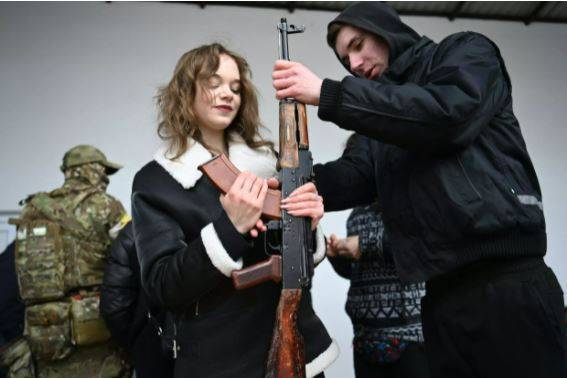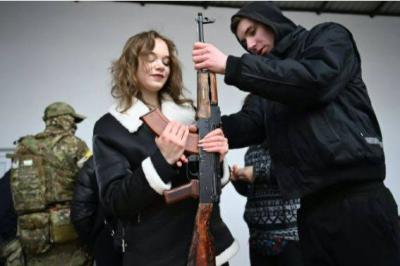Russian forces announced on Saturday a ceasefire in Mariupol to evacuate civilians from this strategic port city in eastern Ukraine on the tenth day of the invasion and following the shock caused by the bombing of the largest nuclear power plant in Europe located in Zaporizhia. The mayor of Mariupol declared on Saturday that Russian forces are besieging the city and conducting "merciless attacks" on it. Vadym Boichenko wrote on Telegram, "For the past five days, our city and our family of half a million people have been subjected to merciless attacks," calling for "continued resistance." He added, "We are seeking solutions to humanitarian problems and all possible ways to free Mariupol from the siege," emphasizing that "our priority is a ceasefire in order to restore critical infrastructure and establish a humanitarian corridor to bring food and medicine to the city."
Shortly afterward, Russia announced a ceasefire to allow for the evacuation of civilians from Mariupol and a second city in eastern Ukraine, following consultations between representatives from Kyiv and Moscow. Russian news agencies reported that the Russian Defense Ministry stated, "The Russian side declares a ceasefire" starting at 7:00 AM GMT, and "opens humanitarian corridors for the evacuation of civilians from Mariupol and Volnovakha."
Control of this city, which has a population of 450,000 and is located on the Sea of Azov, will represent a significant turning point in the invasion of Ukraine. It will allow Russian forces coming from the annexed Crimean Peninsula to connect with the separatist and Russian forces in Donbas after seizing key ports in Berdyansk and Kherson. Since Friday, the military has occupied the Zaporizhia nuclear power plant in southeastern Ukraine, where shelling, according to Ukrainians, caused a fire. Moscow denies causing it.
This assault on the largest nuclear power plant in Europe, which consists of six reactors, has shocked the international community. U.S. Ambassador Linda Thomas-Greenfield stated at the United Nations Security Council on Friday that it represents "a huge threat to all of Europe and the world."
Ukrainian President Volodymyr Zelensky, who will speak to the U.S. Senate via video on Saturday, stated, "We survived a night that could have marked the end of history. Of the history of Ukraine. Of the history of Europe." He added that an explosion in Zaporizhia would have been equivalent to "six times" the Chernobyl disaster. Moscow categorically denied the attack on the site. Russian Ambassador to the UN Vasily Nebenzya stated that this is "a lie." In Moscow, the Defense Ministry accused "groups of Ukrainian saboteurs with mercenaries" of being behind the incident.
The G7 nations announced that they would "impose new severe sanctions in response to Russian aggression." NATO Secretary-General Jens Stoltenberg insisted on the need to "end" this conflict but confirmed that the alliance cannot meet the request to impose a no-fly zone to avoid getting dragged into the conflict. U.S. Secretary of State Antony Blinken asserted, "The only way to enforce something like a no-fly zone is to send NATO planes into Ukrainian airspace and shoot down Russian planes. This could lead to a full-scale war."
Zelensky responded sharply, stating in a video posted by the Ukrainian presidency that NATO "gave the green light to continue bombing Ukrainian cities and villages, refusing to impose a no-fly zone." He added that NATO countries convinced themselves that "a no-fly zone over Ukraine would lead to direct Russian aggression against NATO," considering it "self-anesthetization for the weak who lack internal peace while they possess much stronger weapons than ours."
Meanwhile, a U.S. Department of Defense official announced on Friday that equipment worth $240 million, including essential equipment such as anti-tank weapons, had been delivered to Ukrainian forces "in several locations." Mykhailo Podolyak, an advisor to the Ukrainian presidency, stated that a third round of Russian-Ukrainian negotiations may take place on Saturday or Sunday. However, the chances of making progress seem very slim. Russian President Vladimir Putin warned that dialogue with Kyiv would only be possible if "all Russian demands" are accepted, including assurances that Ukraine will become a "neutral, non-nuclear" state and undergo "compulsory disarmament."
Kremlin spokesperson Dmitry Peskov, in an interview with Sky News Arabia on Friday evening, said, "We are waiting for a third round of negotiations in Belarus with the Ukrainian authorities." He added, "We hope that Ukraine listens to Russia's position and concerns, which is essential, especially to end military operations." The previous two rounds of talks, at the Ukrainian-Belarusian border and then at the Polish-Belarusian border, did not result in a cessation of hostilities, but both parties agreed to establish "humanitarian corridors" for evacuating civilians.
After ten days of war, it is impossible to independently verify the numbers. Moscow claimed 2,870 Ukrainian soldiers and 498 Russian soldiers have been killed. However, Kyiv reports more than nine thousand Russian soldiers have died.
Putin affirmed that Russian forces do not bomb Kyiv and major Ukrainian cities, describing information about Moscow's destruction as "gross propaganda fabrication." In Russia, the Kremlin has intensified its crackdown on all voices opposed to the conflict. Since the start of the attack on February 24, there have been arrests, closures of the few remaining independent media, and the issuing of repressive new texts, while the Kremlin and major Russian media portray the conflict as a "special military operation."
Putin signed a law on Friday that imposes a prison sentence of up to 15 years for those disseminating "false information." Bloomberg News and the BBC announced a temporary suspension of their journalists' activities, while CNN has halted its broadcasts in Russia. Similarly, CBC/Radio Canada announced a temporary suspension of its journalists' activities "due to the law on broadcasting 'false news about the army,'" considering it "a text aimed at criminalizing neutral and objective media coverage of the current situation in Ukraine and Russia."
More than 1.2 million refugees have fled Ukraine, according to the latest UN statistics, prompting significant mobilization, particularly in neighboring countries. Diplomats said the UN Security Council would hold another emergency meeting on Monday to discuss the humanitarian crisis, while the World Food Program warned of food supply shortages in the war-affected areas.
As part of the sanctions, Italy announced on Friday that it had seized a yacht owned by a Russian businessman close to Putin who is subject to EU sanctions. Ferdinando Giuliano, the press advisor to Italian Prime Minister Mario Draghi, tweeted that "the Italian police seized a €65 million yacht owned by Alexey Mordashov docked in Imperia (northwest) under the recent EU sanctions." Mordashov is the owner of the steel group Severstal and is among the Russian oligarchs blacklisted by the EU.
On the other hand, new companies have decided to distance themselves from Russia. Samsung Electronics suspended its shipments to Russia where it controls a third of the smartphone market. Meanwhile, U.S. tech giant Microsoft announced on Friday that it had suspended any "new sales" of its products and services in the country, and luxury goods group LVMH decided to temporarily close 124 of its stores.
In Ukrainian media and on social networks, a call has been circulated to boycott Coca-Cola, which has decided to continue its operations in Russia for the time being. An advisor to the Ukrainian president stated that its hands are "stained with blood." Finally, hundreds of protesters in the Portuguese capital Lisbon formed human chains in front of the embassies of five countries (France, Britain, the United States, China, and the U.S.) to call for "peace in Ukraine" and "impose a no-fly zone to stop Russian attacks."
However, in the Serbian capital Belgrade, about a thousand people demonstrated to express their support for the Russian president and the invasion of Ukraine and their hostility toward NATO, chanting "Serbs and Russians forever brothers," praising "the liberation of Ukraine from the neo-Nazis," according to one of them, echoing Putin's accusations.




